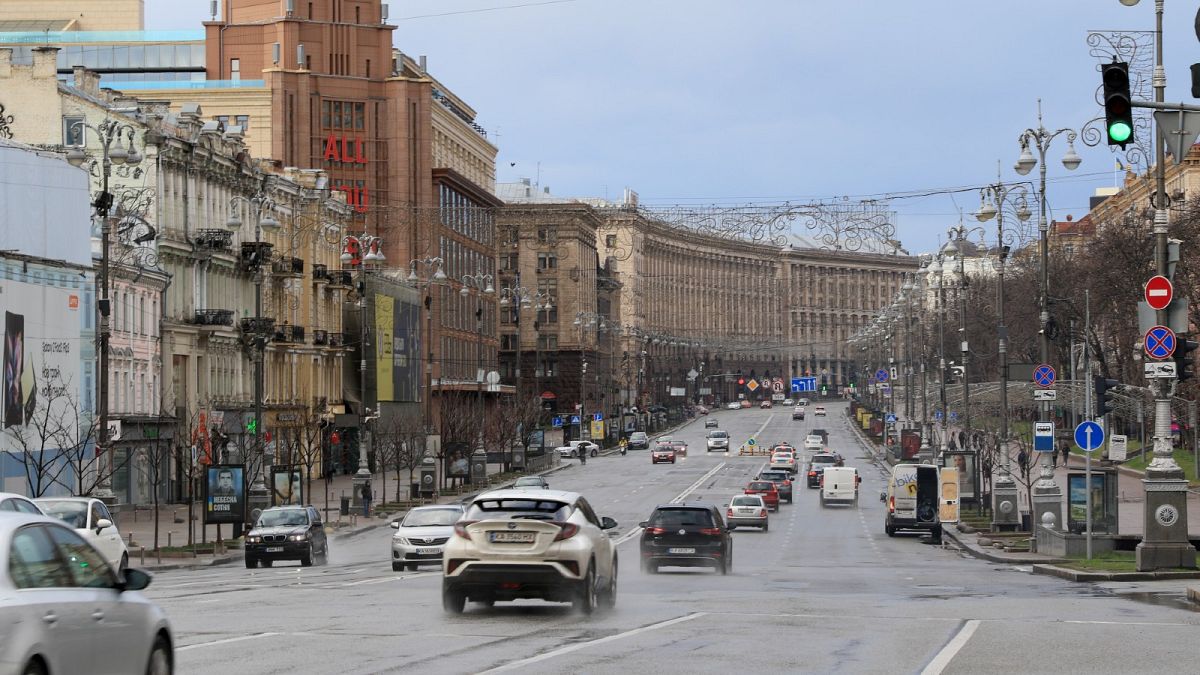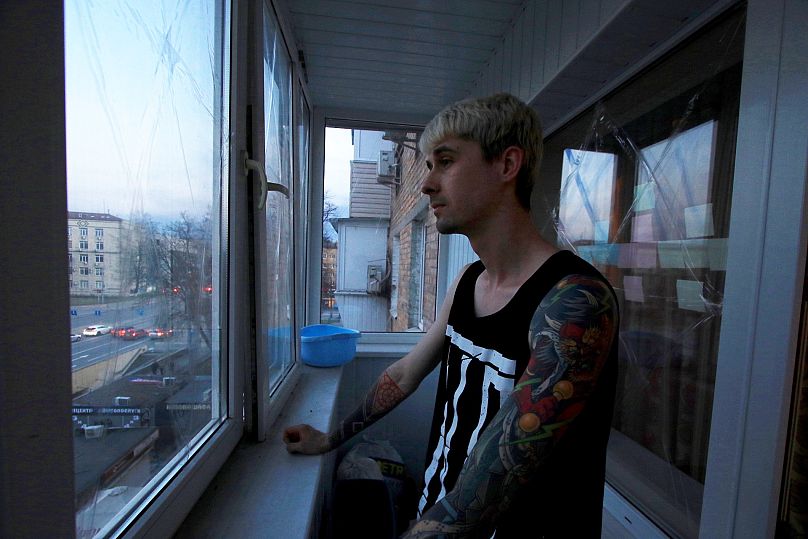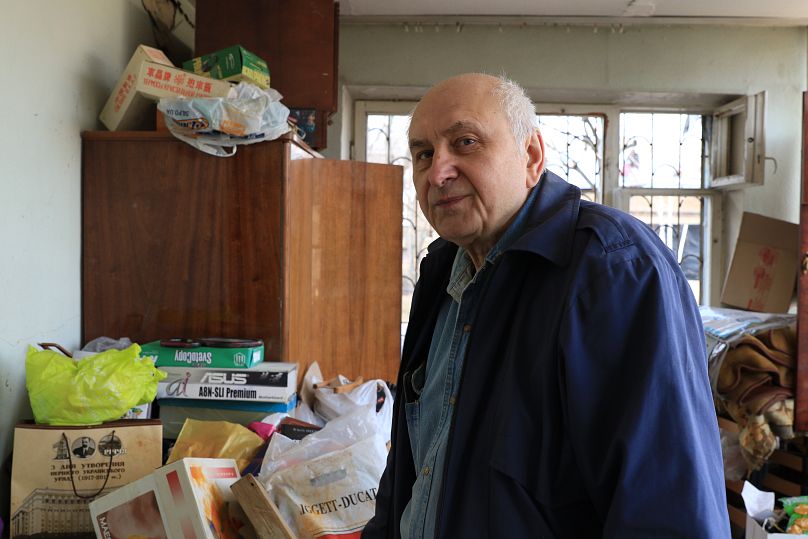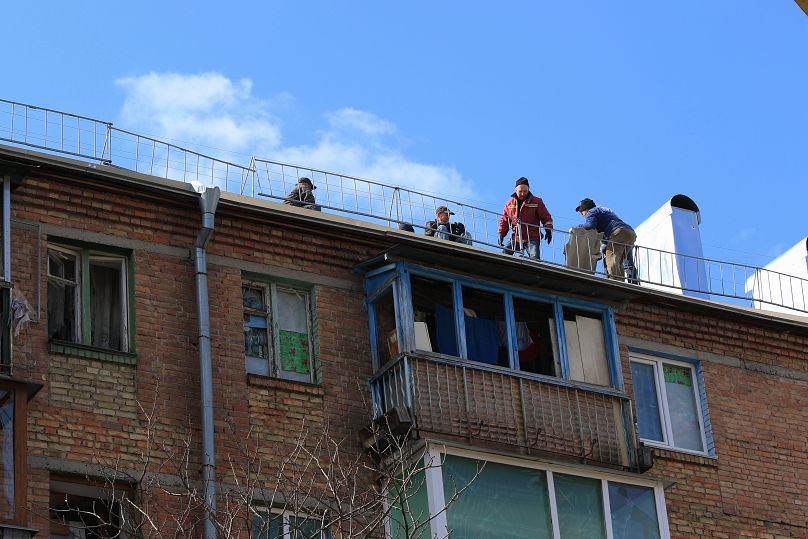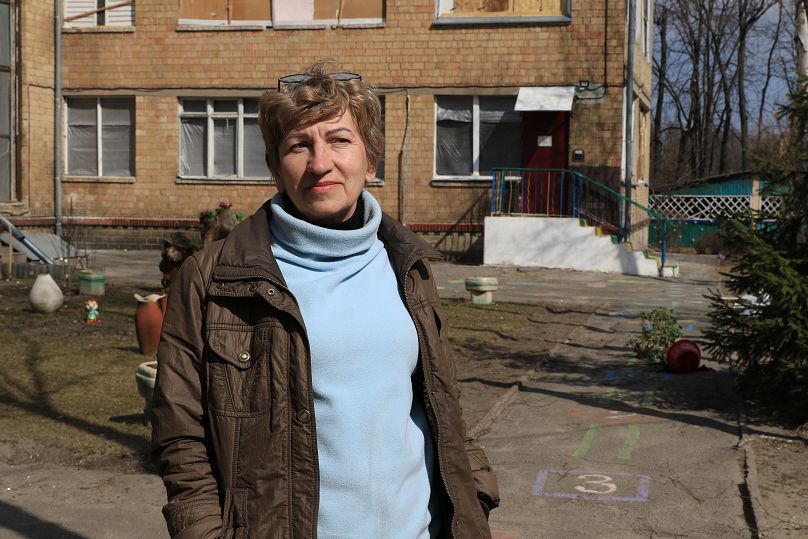Residents have started to return, businesses have been reopening, and grassroots reconstruction efforts have begun in areas that had been damaged by shelling.
Kyiv is now quiet as the bombardments, missiles and rockets that punctuated daily life in the suburbs of the Ukrainian capital are no more.
With Russian troops having retreated to Belarus after a failed bid to take the city, locals are trying to cultivate some normality.
“Life is returning in Kyiv, restaurants are opening, stores are opening, cafes are opening,” said Kyiv resident Svetlana Melnichenko.
“A sense of comfort is finally returning.”
Over the past week and a half, Kyiv has gone from having enemies at its gates to finally being able to breathe a bit again for the first time since Russia's invasion began on 24 February.
Residents have started to return, businesses have been reopening, and grassroots reconstruction efforts have begun in areas that had been damaged by shelling.
At the same time, residents have started to rebuild their own lives as well in an effort to gain a reprieve from the traumas of war for both themselves and their loved ones.
Nevertheless, the ongoing conflict in other parts of the country and the search for missing people amid the rubble in Kyiv's former occupied suburbs continues to cast a shadow on life here, and residents and officials caution that the lingering risks -- both in terms of renewed attacks on Kyiv and casualties from booby traps left behind by the Russians -- make a true return to normal impossible.
“Life has become better,” said Dmitry Gerasimov, a drummer and sound engineer living in Kyiv. “Explosions and sirens are heard less and less.”
Gerasimov lives across the street from Kyiv’s television tower, which was struck by Russia in the early days of the war, after which he started spending some nights sleeping in his hallway away from windows. Since the bombs have stopped falling, he has managed to return to his bedroom full-time.
“In Kyiv, you feel that with every day it is getting safer and safer,” said Ivan Kurilko, the manager of a pizza restaurant in central Kyiv that opened up its doors for sit-down service around the time Russian forces pulled back from the capital.
Compared to most of the war, Kurilko said the current situation has brought with it a welcome change in atmosphere.
“People are starting to go out,” he said. “We understand that we can open our establishment to guests.”
Grocery stores and petrol stations have remained open throughout the war in Kyiv, but now, more and more restaurants, cafes, bars, pharmacies, hair salons and other mainstays of public life have been opening their doors.
A ban on alcohol under martial law was abolished, the nightly curfew was pushed back from 8 to 9 pm, and several metro lines have started limited operations, according to Kyiv officials.
A web app called LUN Misto shows residents which businesses are open across the city, and although precise numbers are unavailable, the app’s map display is now dense with active locations throughout Kyiv.
On 6 April, Kyiv Mayor Vitaly Klitschko urged residents who left the city to stay away until the situation improves further.
But as life in Kyiv has gradually become more secure, many people are coming back anyway.
Daria Kolomiec, a DJ, former TV host, and music curator who fled the city in the early days of the war, said she might be returning to Kyiv in the next several days.
“I didn’t unpack my luggage,” Kolomiec said, speaking about her time spent outside the city. “I feel like I’m ready to go [back] now because I miss it so much.”
Daria Kryzh left the city for Ivano-Frankivsk in western Ukraine at the start of the war as well but has since returned in late March to reopen Squat 17b, a café she had co-founded. She said she did so out of a desire to give back to her community.
“The people, they need to see each other, to communicate, to have the opportunity to give a hug to someone,” said Kryzh. “The situation is getting better. And now we pushed [the Russians] back, and people are reading this information and they understand that Kyiv is the safest city in the country."
“They are ready to come back to become [a] part of the city they love most of all,” she added
However, according to the city’s first deputy mayor Mykola Povoroznyk, who also assumed the role of head of the Kyiv military administration since the war began, much work needs to be done.
He stated that there are over 200 buildings in the city that have been damaged, over 150 of which are civilian sites, adding that the city is still gathering the necessary data to officially begin its reconstruction programme.
According to officials with the Ministry of Internal Affairs, the Ukrainian government has rolled out an app called Action that Ukrainians can use to report damaged buildings, which will reportedly allow the state to rebuild and compensate people after the war.
But community-led reconstruction efforts have already started. At a residential complex in Kyiv’s Podilskyi District, which had been heavily damaged by a Russian rocket on 18 March, locals have started picking up the pieces of their lives and rebuilding what they lost.
“We’re covering the windows that were ripped out and were renovating the roofs wherever we can,” said Mikhail Vydmydenko, a man living nearby who was been working on reconstruction at the complex for a week in late March. “We have to do this for all the residents who have their lives here and don’t have anywhere to go.”
Pavel, a resident of the complex, had the entire wall of his apartment blown off by the rocket strike. He has since returned every day to collect the items that are most important to him — his collection of films and music, his family photos, and more.
At a nearby kindergarten, the strike shattered windows and sent chairs and tables flying.
Barbashyna, a speech instructor who worked at the kindergarten for 40 years, arrived several hours after the explosion took place.
“I left work in the evening and this was a beautiful kindergarten,” she said, “And I came to work [in the morning] and everything was broken.”
But weeks afterwards, she was back, supervising reconstruction efforts at the school.
“When I arrived here, I began to understand that one has to wipe off your cheeks and do something. Because sitting and crying doesn’t make sense,” she said.
Despite the productive mood in the city, residents like Melnichenko remain wary of future Russian attempts to bring the war back to Kyiv. For Povoroznyk, the threat level in the capital has changed little since Russian forces pulled out of the area.
“Can anyone tell us there won’t be another attack on the city of Kyiv from Belarus? No one can tell us that,” Povoroznyk said.
Even if a true and stable peace arrives in Kyiv, the realities of the Russian invasion in other parts of the country still looms large in residents’ minds, especially those who fled to Kyiv from other parts of Ukraine.
“There is an opinion that Russia will now throw all its forces into the Donbas, and my parents are there,” said Gerasimov, who fled the town of Debaltseve in the Donbas when the war began there in 2014, before coming to Kyiv a few years later. “I cannot say that I am completely calm.”
For many inhabitants in Ukraine’s capital, life will not feel entirely secure until the conflict in other parts of the country comes to an end. And despite the improvements he has felt, Gerasimov won’t celebrate until the very end.
“I’m getting married [to my girlfriend],” he said about his post-war plans. “We have a bottle of French wine, [but] we won’t drink this bottle. We have agreed to drink this bottle not when the war is over — but when we win.”
